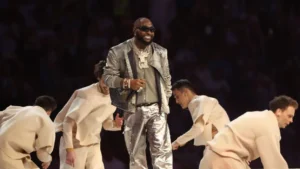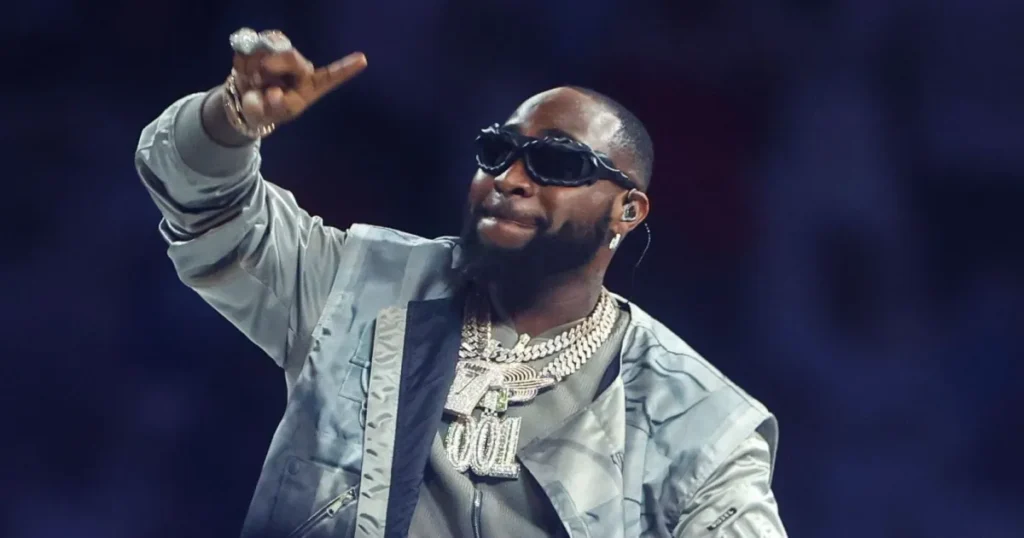When Davido stepped onto the stage for the launch of the 2022 FIFA World Cup soundtrack, he didn’t just perform a song—he made a bold cultural statement. The Nigerian Afrobeats icon lit up the global stage with a stunning performance that showcased not only his exceptional musical talent but also the growing influence of African music in international spaces.
Held in Doha, Qatar, ahead of the world’s most prestigious football tournament, the soundtrack launch event brought together artists from around the world to celebrate unity, diversity, and global harmony through music. Davido’s performance, particularly his contribution to the official soundtrack “Hayya Hayya (Better Together)”, captivated millions, solidifying his place among the most recognized musical ambassadors from Africa.
“Hayya Hayya” — A Global Anthem of Unity
The song “Hayya Hayya (Better Together)”, which served as the lead single of the official FIFA World Cup 2022 soundtrack, featured Davido alongside American R&B singer Trinidad Cardona and Qatari artist Aisha. The trio delivered a rich fusion of Afrobeat, R&B, and Arabic musical influences, creating a celebratory anthem that encapsulated the spirit of togetherness, inclusion, and joy that the World Cup represents.
Davido’s verse stood out, carried by his signature charisma and melodic flow. Singing in a mix of English and Yoruba, he brought a distinctly African flavor to a song that was destined to echo across stadiums, televisions, and playlists worldwide. His performance symbolized more than entertainment—it was a proud representation of Nigeria, West Africa, and the continent at large on football’s biggest stage.

Reactions and Applause from Around the World
Immediately after the release of the soundtrack and Davido’s performance at the launch, fans and industry professionals across the globe showered him with praise. On social media, hashtags like #DavidoAtFIFA, #HayyaHayya, and #NaijaToTheWorld trended for days. The music video for “Hayya Hayya” quickly amassed millions of views on YouTube, while the song topped charts in countries as far-flung as Brazil, India, and the United Arab Emirates.
Music critics lauded the track’s universal appeal and the way it merged cultural sounds without losing authenticity. Billboard described Davido’s feature as “infectious and uplifting,” while African publications hailed it as a “proud moment for the Nigerian music industry.”
For many fans, seeing Davido headline a FIFA soundtrack was more than just a performance—it was an emotional, pride-filled moment. It meant representation. It meant recognition. It meant that Afrobeats, once considered niche outside the continent, had fully arrived at the center of the global cultural conversation.
FIFA and the African Sound: A Strategic Embrace
FIFA’s inclusion of African music in its soundtrack is not accidental. Over the past two decades, African music—especially genres like Afrobeats, Amapiano, and Afro-house—has steadily gained traction across the globe. From nightclubs in Paris to Coachella stages and London radio stations, African rhythms now play in spaces once dominated by Western pop.
By selecting Davido, one of the most internationally visible Afrobeats artists, FIFA signaled its recognition of this global shift. The organization also demonstrated an effort to reflect the diversity of the sport it governs—one where players, fans, and cultures from all continents converge every four years in a celebration of unity.
Davido’s involvement in the soundtrack made that inclusivity feel genuine and organic.
Davido’s International Milestones
Though the FIFA performance marked a new high in Davido’s career, it was the latest in a string of international achievements. For years, he has been one of the key figures pushing Afrobeats into the global mainstream. His 2017 global smash hit “Fall” became one of the most-streamed African songs in the United States. He has collaborated with Chris Brown, Nicki Minaj, Young Thug, Lil Baby, and Summer Walker, among others.
Davido has sold out London’s O2 Arena, performed on international stages like Wireless Festival, and has been featured in campaigns for brands such as Pepsi and PUMA. His 2020 album “A Better Time” and his 2023 release “Timeless” received critical acclaim and performed exceptionally well on both African and global charts.
The FIFA soundtrack performance served as both a milestone and a symbol of his hard-earned place in the international music pantheon.
A Moment of National Pride for Nigeria
Back home in Nigeria, Davido’s performance inspired widespread celebration. Politicians, fellow musicians, and fans commended him for making the nation proud. The Nigerian Minister of Youth and Sports Development took to Twitter to thank the artist for “putting Nigeria on the global stage yet again,” while thousands of Nigerians expressed gratitude for the visibility he brought to their country and culture.
In a time when Nigeria continues to battle economic and security challenges, such moments of global recognition provide a unifying source of national pride. Davido’s appearance was not just about music—it was a reminder of the creativity, resilience, and global relevance of Nigerian youth.
The Cultural Power of Afrobeats
Davido’s FIFA spotlight performance also underlines the growing cultural power of Afrobeats. Once confined to local radio stations and neighborhood parties in Lagos, the genre has now become one of the most influential sounds in global music.
With streaming platforms embracing African content, and international artists seeking collaborations with Nigerian stars, Afrobeats is no longer a trend—it is a global cultural force. The genre has become a vehicle for storytelling, social commentary, and global representation, while retaining its local identity.
Davido, along with peers like Wizkid, Burna Boy, Tiwa Savage, and Tems, continues to serve as an ambassador for this powerful movement.
The Importance of Representation on Global Platforms
Davido’s presence at the FIFA soundtrack launch matters beyond entertainment. It represents progress in global recognition for African creators. For too long, African talents were marginalized in international platforms. Now, not only are they being included—they are being celebrated.
His feature in such a universally watched event breaks down barriers and opens doors for future African artists to participate in similar global moments. Whether it’s in music, fashion, sports, or film, representation matters—and Davido’s success signals that the world is ready and eager for African voices.
What’s Next for Davido?
Following the buzz from the FIFA performance, Davido continued to build momentum with new music, tours, and brand partnerships. His “Timeless” album release further cemented his evolution as a matured artist and global performer. The success of the FIFA performance also sparked rumors of future collaborations with global pop stars and even talks of more soundtrack appearances for major sporting and cinematic events.
Additionally, he remains an active philanthropist through the Davido Foundation, focusing on education and youth empowerment in Nigeria. His commitment to giving back is part of what makes him not just an artist—but a symbol of impact and influence.
Final Thoughts: A Defining Moment for Davido and Africa
Davido’s performance at the FIFA World Cup 2022 soundtrack launch was more than just a few minutes on stage—it was a defining moment in the cultural timeline of African music. It showcased the power of rhythm to unite people across continents, the growing reach of Afrobeats, and the undeniable brilliance of Nigerian talent.
For Davido, it was the culmination of years of hard work, reinvention, and dedication to pushing African music beyond borders. For Africa, it was yet another loud, colorful, and joyful announcement: we’re not just part of the global conversation—we’re leading it.







